Egypt is one of those places that you’ve always wanted to go to since you learned about the Great Pyramids in primary school or watched Brandon Fraser’s, The Mummy. As ancient wonders go, Egypt is arguably at the top. Thing is, over this past decade, word on the street is that it’s not a good time to go. Ignoring those warnings, I’ve been to Egypt twice and have a pretty good idea of whether Egypt is safe for travel.
If you’re thinking about travelling to Egypt, it’s smart that you’re doing your due diligence to find out whether you should go or not. Keep reading below to find out what it’s really like and to answer the “is Egypt safe” question once and for all.
Read more about Egypt
- Things you need to know before going to Egypt
- 3 days in Cairo – pyramids, markets, and local food
- How to plan a 10 day Egypt itinerary
- Nile cruise from Luxor to Aswan – cruise ship or dahabiya?
- What to pack for a trip to Egypt
What tour operator did we use in Egypt?
- As you’ll find out below, one of my biggest tips is to travel Egypt with a local tour company. On my latest trip to Egypt, I used Djed Egypt Tour a second time and they were perfect in terms of planning an itinerary that we wanted and more importantly, they had amazing people on the ground (Egyptologists and drivers).
Table of Contents
Jump to the topics that you’re most interested in.
In This Article
- Is Egypt safe to travel to right now?
- Why do people think Egypt is unsafe?
- So how safe is Egypt?
- What I actually experienced
- What the locals are saying
- Why is right now one of the best times to go to Egypt?
- Common scams and annoyances
- How is Egypt for solo travellers?
- Travel insurance in Egypt
- Health concerns in Egypt
- General safety tips for Egypt
- Keep your essentials safe
- Recommended tour operators in Egypt
- Final thoughts
Is Egypt safe to travel to right now?
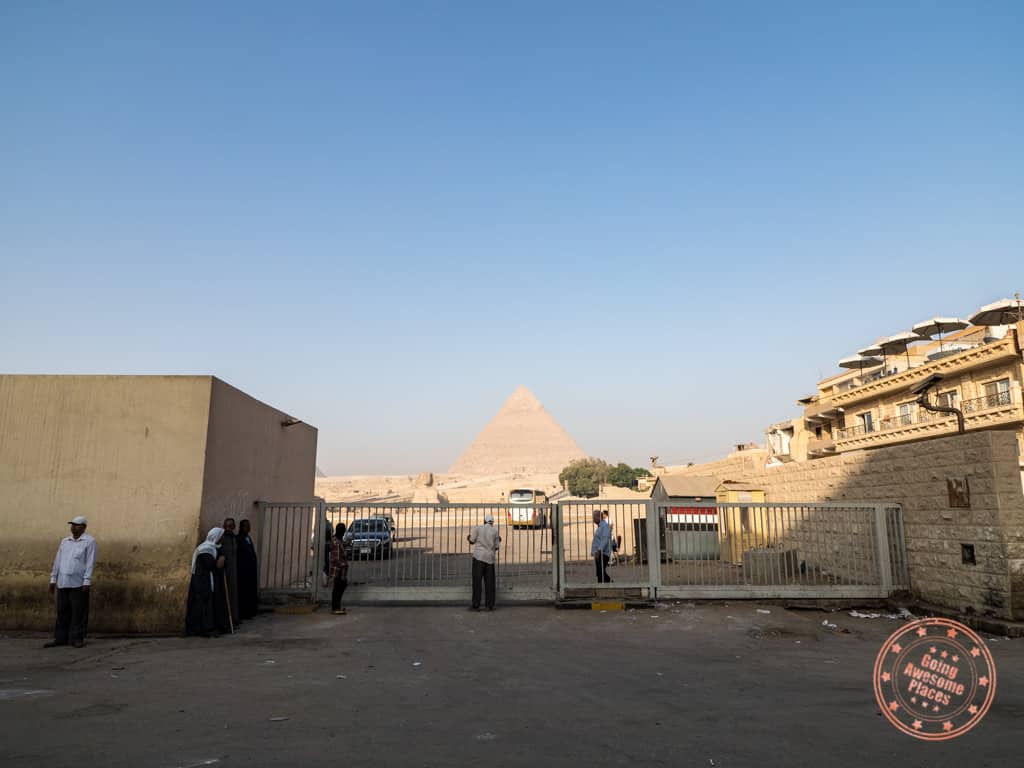
Tell anyone that you’re going to Egypt and the first thing they’ll ask you is “is Egypt safe to travel to right now?” it’s truly a sign of the times because 15 years ago, they’d be asking if you’re going to see the Pyramids, Tutankhamun, and the Nile.
Egypt is a place that’s high on many people’s bucket lists as a cultural gem, a cradle of civilization, and home to some of the most remarkable ancient wonders. When you go, you’re even more impressed by the fact that what’s been discovered so far isn’t even close to being complete yet.
To answer the very simple question of “is Egypt safe?”, you’ll have to entertain me a bit as I try to explain it and what I’ve personally observed on two separate trips to the country.
But wait! So far I haven’t even touched on the big elephant in the room – COVID-19. Let’s do that first.
Why do people think Egypt is unsafe?
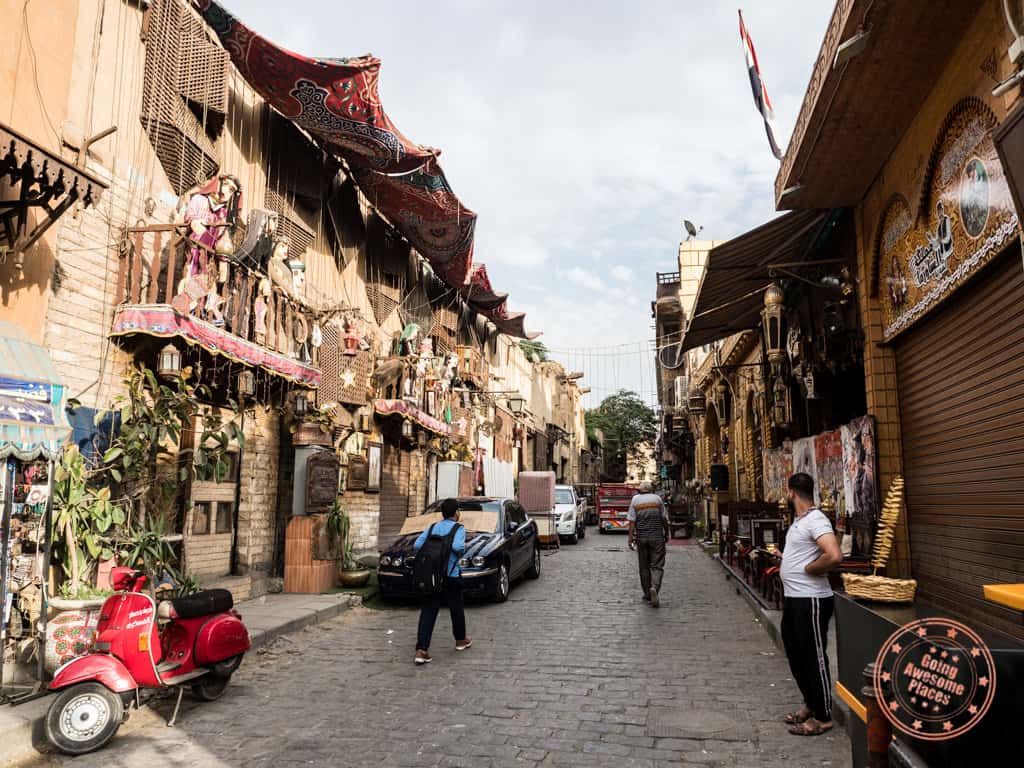
So why is Egypt deemed “too dangerous” and why are people scared to travel to Egypt?
The danger that we associate to Egypt stems from decades of history but without this turning into a giant history lesson, let’s rewind the clock back to 2011.
Egyptian Revolution of 2011
Arab Spring of 2011 is what it’s known and the spark was Tunisia with their local uprising and this gave other nations in North Africa inspiration to do the same.
It truly spread like wildfire as most people remember early 2011 as a time when the news was filled with chaos and revolution after another. This came to a head for Egypt on January 25, 2011 when widespread demonstrations, marches, occupations of plazas, civil resistance, and strikes took over.
At the core of it was the public’s anger towards President Mubarak primarily because of increased police brutality but also corruption, civil liberty, political freedom, unemployment, inflation and wages.
Millions of protestors came and what started off as friendly protests quickly escalated into a violent clash where places like Cairo were turned into a war-zone.
The primary demand was for Mubarak to step down and that eventually happened on February 11, 2011. Things didn’t settle down there as there was a period of rule by the military before the Muslim Brotherhood party took power with Mohamed Morsi elected into presidency in June 2012. The government continued to be engulfed in controversy as a coup d’état deposed Morsi because of several unpopular decrees and lack of military support. This lead to an early election and El-Sisi was elected president in 2014.
That’s a lot of presidents in the span of 3 years. A lot of civil conflict. A lot of back dealings. A lot of instability. A lot of work not getting done.
It’s no surprise that with CNN airing all of the violence, tourism took a nose dive, the Egyptian Pound dropped, and infrastructure and archeological projects were put by the wayside.
More events that didn’t help
Following the revolution, there were a few other incidents that made the spotlight that didn’t help.
- May 2, 2014 – a bomb on a tour bus in Sharm El Sheikh detonated, killing one and injuring four others.
- October 31, 2015 – a Russian plane bombed leaving Sharm El Sheikh. As a result, Russia stopped all flights to Sharm El Sheikh and had a ripple effect on tourism as a whole.
- January 8, 2016 – tourists were attacked in Hurghada and again in 2017 when a radicalized German stabbed several tourists.
- December 29, 2018 – 3 Vietnamese tourists and local guide killed by roadside bomb that hit a bus near the Giza pyramids.
- May 19, 2019 – South African tourists on a tour bus injured by a roadside bomb next to the pyramids in Giza.
If you look at the Russian plane incident alone, tourism income dropped from $12 Billion in 2010 to almost half in 2016.
As a result, Egypt is on many nations’ travel advisory list.
- Government of Canada – Egypt travel advisory
- US Department of State – Egypt Safety Warning
- New Zealand Ministry of Foreign Affairs and Trade – Safe Travel
- Australia DFAT Smart Traveller – Egypt Travel Advice
- UK Foreign & Commonwealth Office Travel advice for Egypt
What a way to start off an article about safety right? I have to admit that all of these are scary.
I went to Egypt in 2017 and was in Hurghada not long after those stabbings and the Russian plane was still a hot topic. I went to Egypt again in October 2019 only 5 months after the latest incident in Giza.
There’s no hiding it. There’s clearly been uncertainty and instability in the government and Islamic terrorists have targeted tourists but here’s why I wasn’t too worried before deciding to go to Egypt on both occasions:
- Complicated politics rarely involves tourists and usually only means frustrating government shutdowns. Being a foreign citizen actually affords you protection because they don’t want to piss off other countries.
- Terrorist attacks are sadly the kind of world we live in today and it can happen anywhere you go (Nice truck attack, New York Times Square car crash, or Christmas Market stabbing in Strasbourg, France). Is that going to stop you from travelling?
- If you look closely at the travel advisories, it’s primarily for regions that you’ll unlikely visit – the Sinai Peninsula (except Sharm el Sheikh), and the Western Desert bordering on Libya.
So how safe is Egypt?
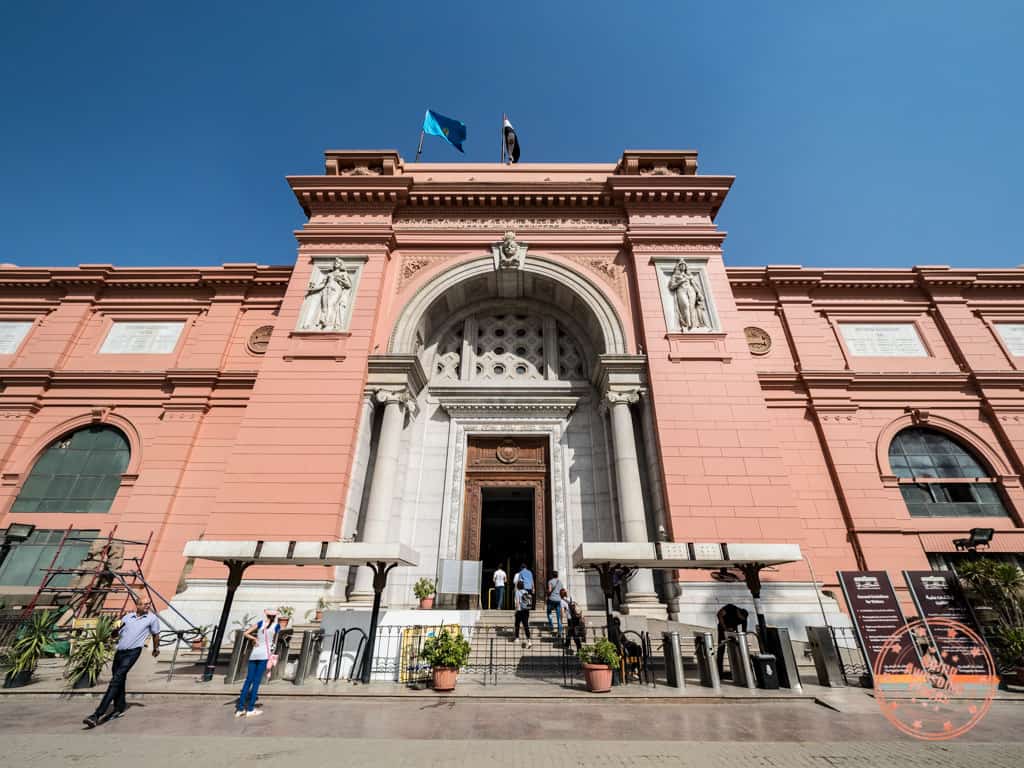
Now that’s the million or shall I say billion dollar question.
With everything you’ve read above, there’s no denying that the past decade for Egypt has not been a good one. There are some regions like the Libyan border and the Sinai Peninsula that you just shouldn’t go to and there’s a threat of terrorism that you could say is slightly elevated because of the region Egypt is in.
The honest truth is that Egypt isn’t 100% safe but it’s still a country that can be safely travelled through because there’s still a large part of the country that welcome tourists with open arms. Egypt is very safe to travel as long as you stick to certain destinations, work with a reputable local tour operator, and be a smart traveller.
The only no-go’s in the country are what you see in the travel advisories which is to avoid the Sinai Peninsula (Sharm El Sheikh is safe) and in general do not go into the western desert. In both instances, if you must, make sure you do so with an (armed) escort.
I know the above sounds a bit vague but here’s the deal. There’s will from the government and the people to make tourism a priority. Sure the people still have squabbles with their government and corruption is still abound but everyone agrees that drastic action like 2011 is in nobody’s interest. Now is the time for the country to rebuild and make sure it’s a prosperous time for all.
If we take a more analytic approach, tourism tumbled to 9 million visitors from 14 million. This continued to drop to 5.4 million in 2016 but has since rebounded to nearly 9 million in 2018. It is now one of the fastest growing destinations in North Africa. If my latest trip to Egypt is an indication, tons of people are still going and you should go.
What I actually experienced
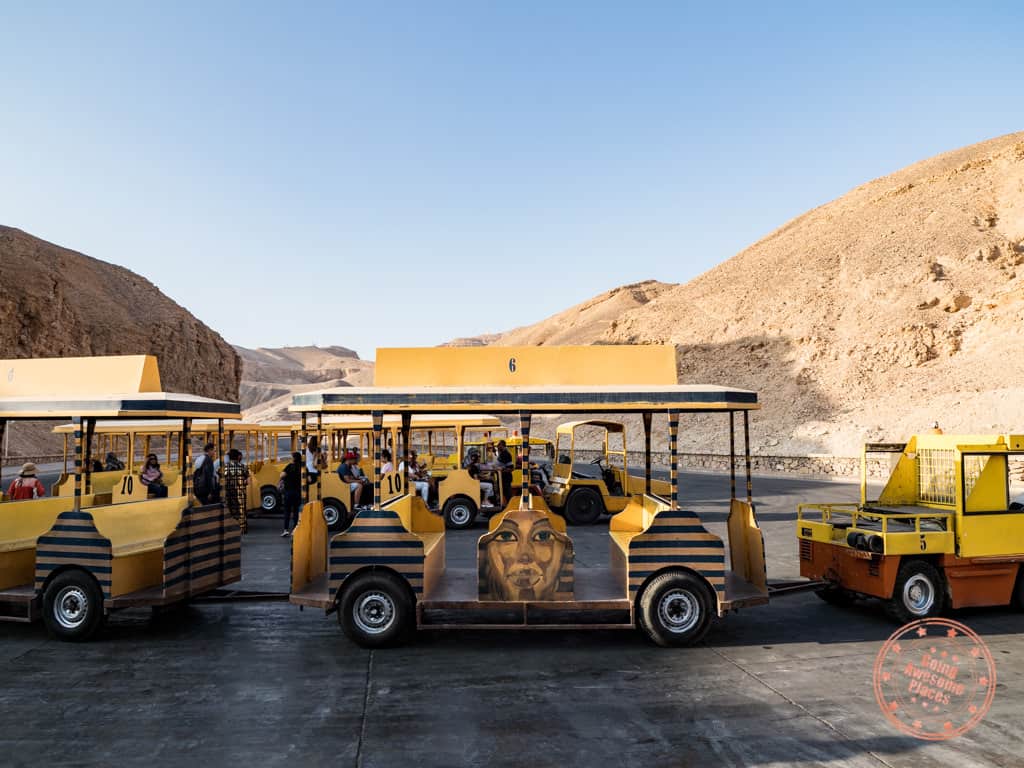
I remember on my first trip thinking about how unfortunate it is that the locals have to pay for the effects the country’s problems. Selfishly, I also remember thinking how lucky I was to go at a time when tourism is down because I get to reap the benefits of heightened security, “lightening doesn’t strike twice” if you believe that theory, reduced crowds, and cheap prices.
What I tell everyone that asks the “is Egypt safe to travel to” question, is that I didn’t notice anything on the trip that made me feel unsafe. This isn’t even an exaggeration. You know you go to certain places in the world where you feel like you really need to put up your guard because there’s extreme shadiness or legitimately feel like you’re putting yourself in danger by being in an area for too long. Ethiopia was one of those places when I was close to the South Sudan border, and more recently I swear that there was a pick pocketer in every corner.
I rationalized my feelings into a few of these thoughts:
- Egyptians are incredibly friendly and will go out of their way to make sure you have a good experience. They’re passionate about their country and want visitors to see how beautiful Egypt is.
- The country needs tourism and recently they’re finally starting to recognize this. It’s a symbiotic relationship – we want to see Egypt and it’s in Egypt’s best interest to keep things safe for tourists.
- A majority of our time was spent outside of Cairo. Once you’re out in smaller cities like Luxor and Aswan, the small villages, towns, and on the Nile, you’re completely disconnected from any perceived chaos. These are just people trying to make an honest living and getting on by. Most locals would tell you that they barely noticed that a revolution was happening because they’re so removed from those issues.
- We walked the streets of Cairo, Luxor, and Aswan at night, through smaller streets and big ones and besides the “Jackie Chan” cat calls and the stares, it felt perfectly normal.
- Tour operators like Djed Egypt Travel really do an amazing job at making you feel safe and then also showing you why Egypt is safe. Granted, yes, we were escorted by a local guide, but that perception of Egypt as this “war zone” is so far from reality.
- While on the dahabiya Nile cruise is when I felt 100% safe and why I say it’s the best experience you’ll have in Egypt.
- There was an excessive amount of security everywhere we went. I can’t say how much of it is for show but with the roadside check points, police stationed all around, the registering of our itinerary be shared with the police (since we were with a tour operator), and x-ray scanners. I guess you can take it both ways but the sense I got was that the government really doesn’t want more incidents with tourists and are doing what they can to mitigate those risks.
What the locals are saying

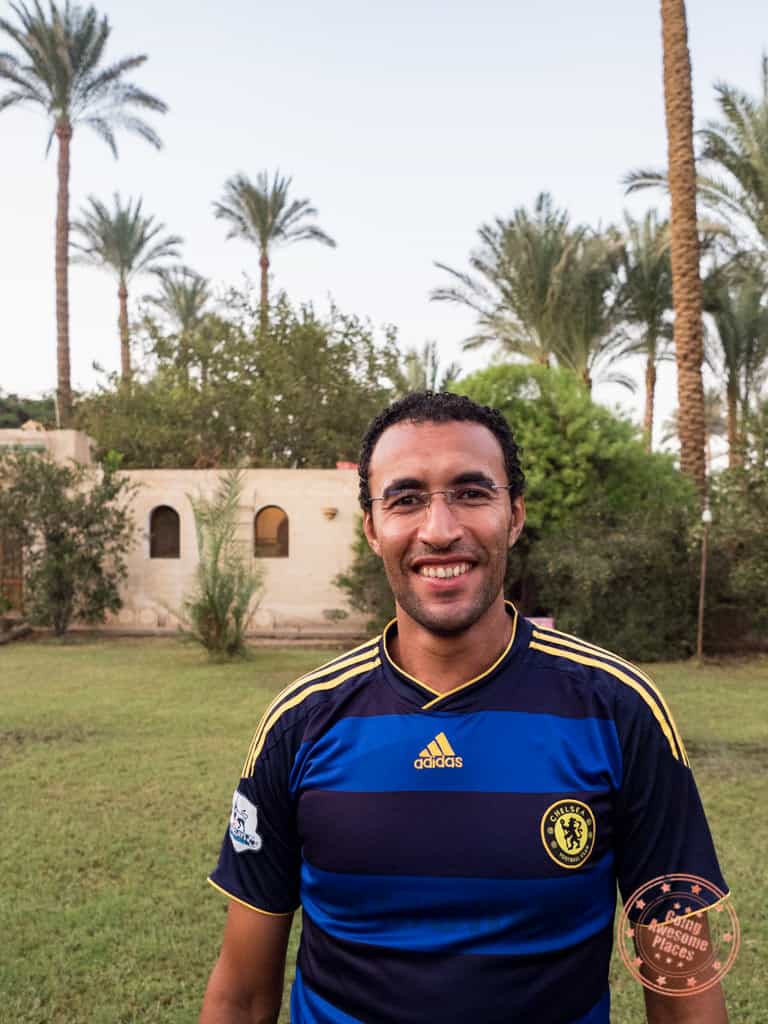
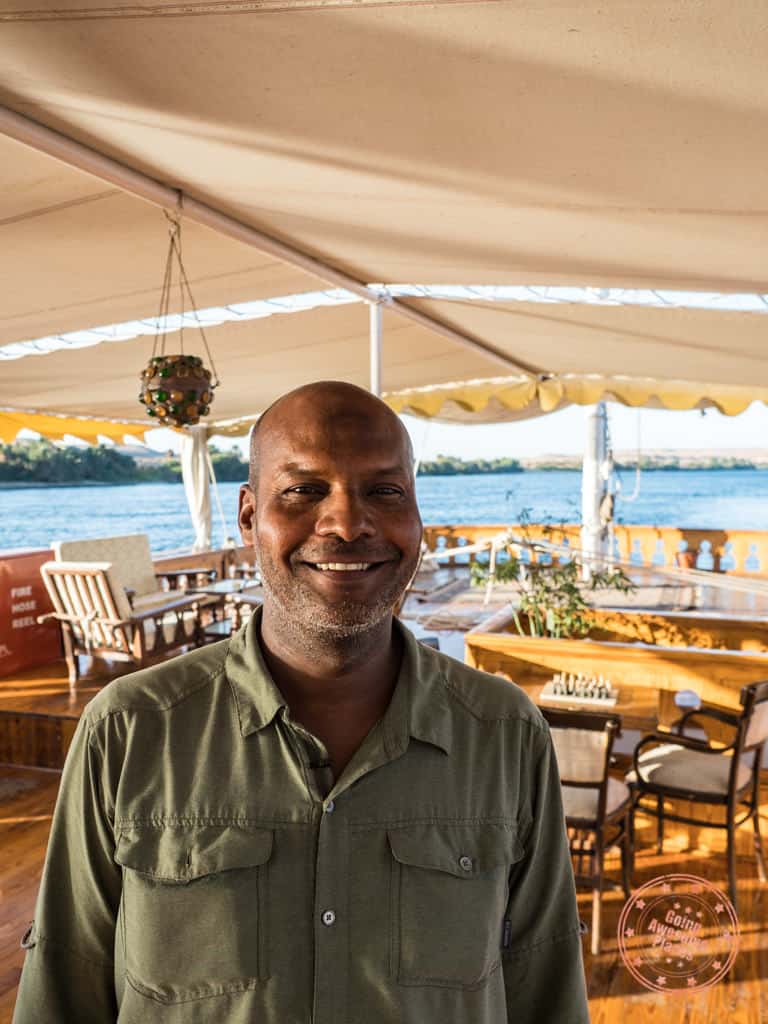
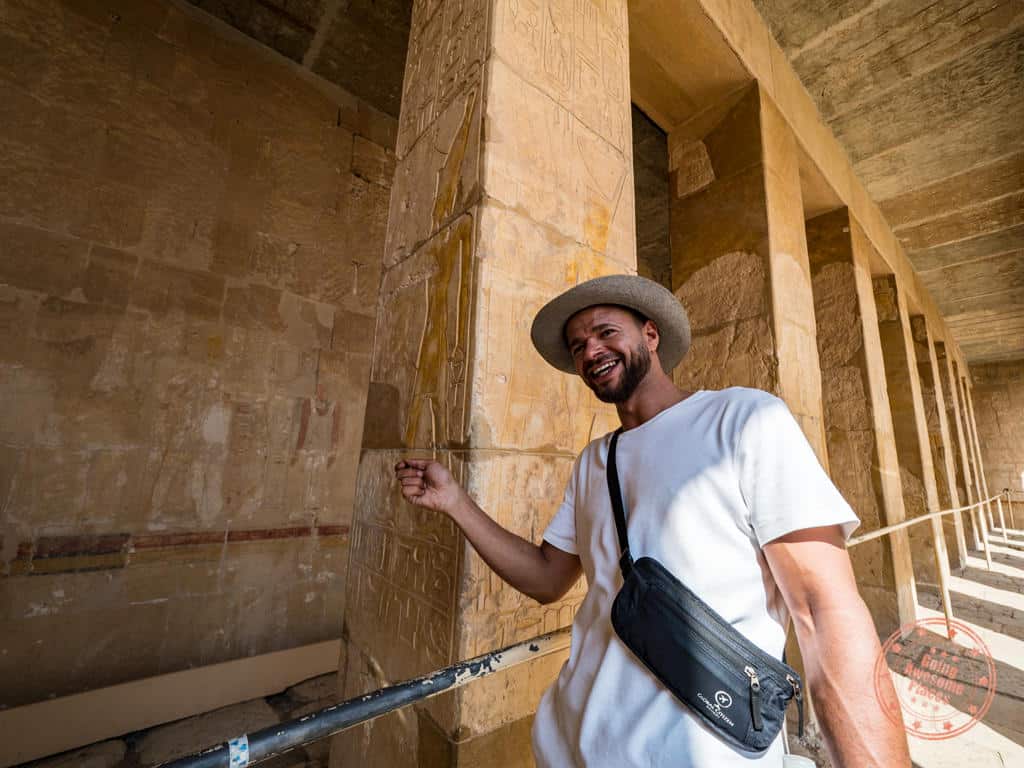
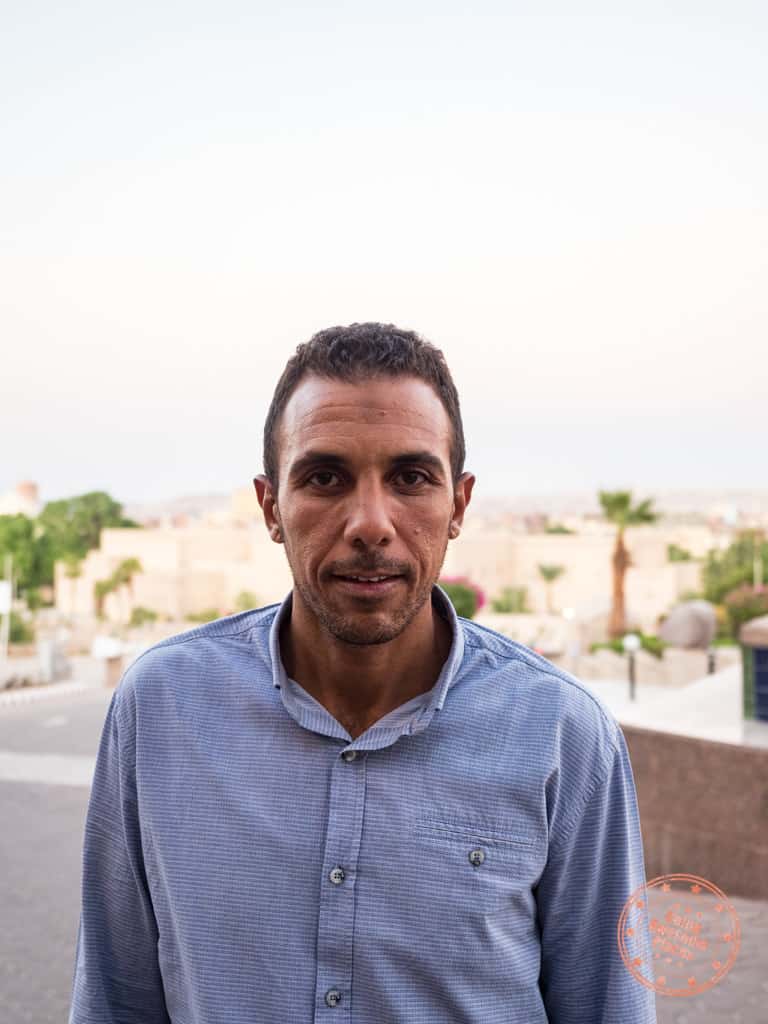
When you landed on this page, a video should’ve started to play. Turn on the sound because in the video I interview our guides to get their thoughts on safety. If the player didn’t work, head to the YouTube video.
I admit it’s a little biased because they work in the industry, but like them, I think it’s as good a time as ever to go to Egypt.
Why is right now one of the best times to go to Egypt?
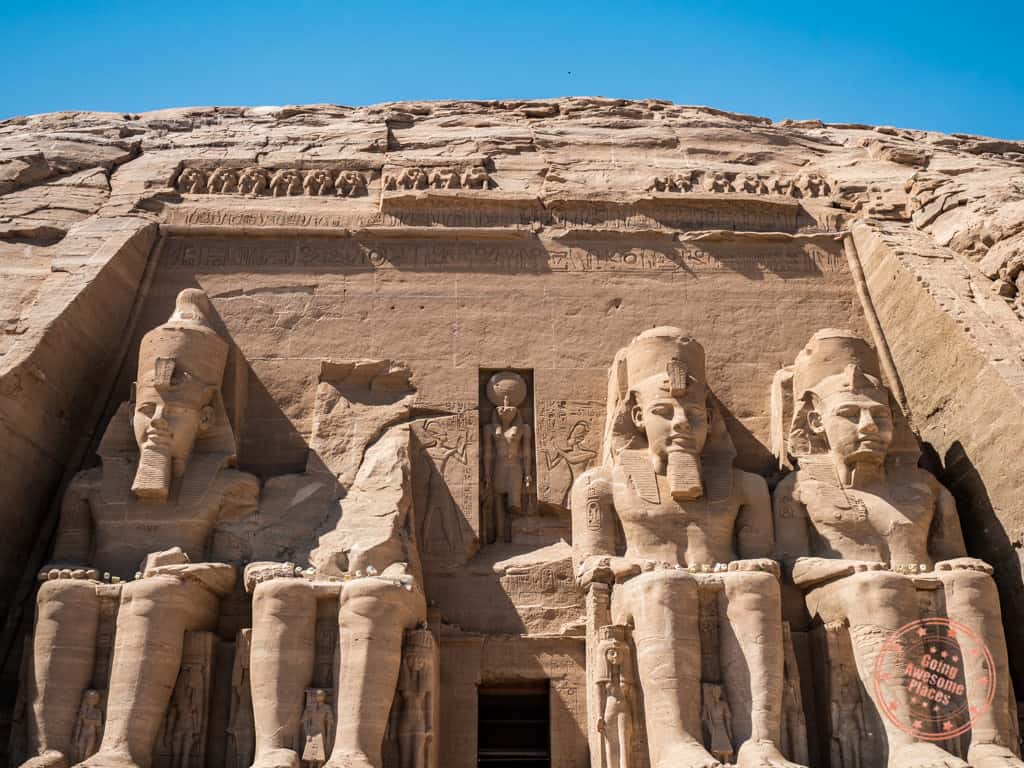
Perfect segue. It’s a great time to go to Egypt.
- It’ll still feel busy at places like the Giza Plateau but almost every other place was never over-packed with tourists which is how things were before.
- Companies are desperate for your business and as a result prices are incredibly cheap.
- During my visit to Hilton Hurghada (now closed), the resort was at less than half capacity and I loved it. Now, only the Hilton Hurghada Plaza is left in the region.
- With so much scrutiny on safety and Egypt wanting to turn that image around, security is at an all-time high which can discourage further attacks.
Common scams and annoyances
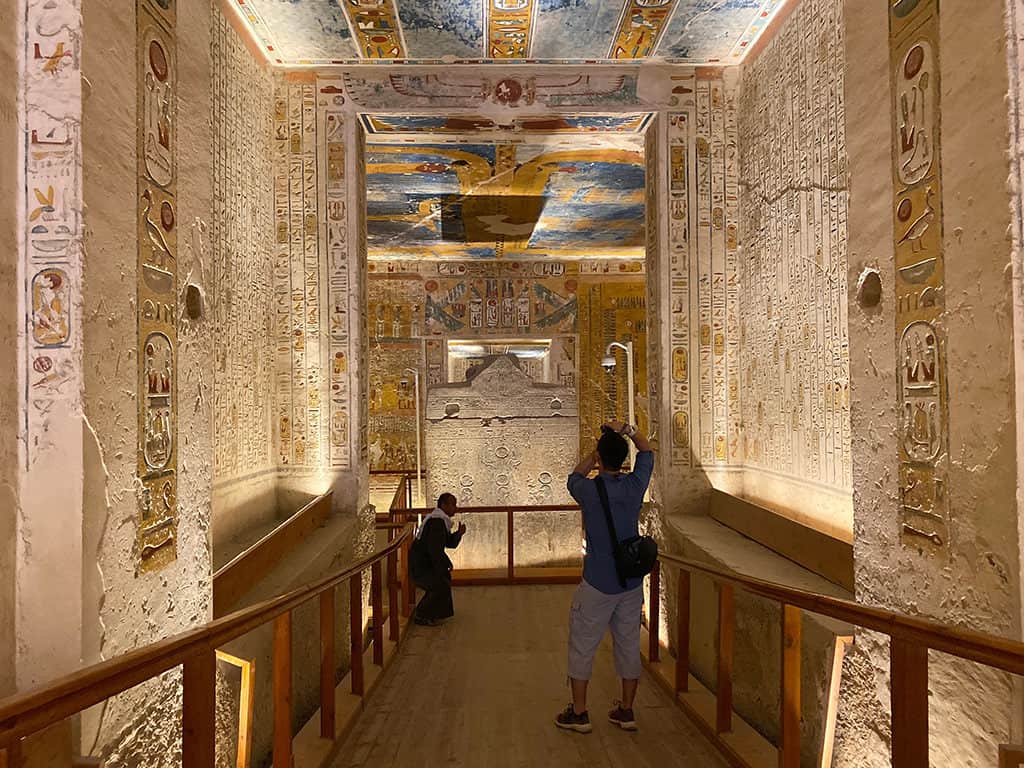
Every country is different and every has a different way of doing business that is culturally influenced. As a seasoned traveller, you learn to understand it, respect it, and deal with it. You are after all in their country and those behaviours and customs are part of the package.
As I talk about in the things to know before going to Egypt guide, while I never felt in danger, I was extremely annoyed about a couple of things. You can read about it in more detail there but here’s are the ones that you need to know about:
- Security guards – All archeological sites will have guards at entrances or roaming around. Their actual responsibility is to enforce camera rules and protecting the ruins but their side-hustle is to take photos for people, sneak people into restricted areas, and provide loose guiding after which they’ll shamelessly ask you for tips. The hook is that they’ll ask you for where you’er from or they’ll literally try to provide you their service (i.e. tell you to look at something in a tomb) without you actually accepting.
- Hassling at souvenir shops – There are always shops that line the entrances to ancient sites. They all use the same strategy of calling for you and asking your name or where you’re from. They also use the $1 USD hook for something they’re selling which is not real. Once you engage, they’re relentless in making a deal and may even follow you as you walk away.
- Camel scam – There’s a common scam out there where camel owners will advertise a dirt cheap price but what they actually mean is that it’s the price to get on which means the price to get off the camel is to be revealed later. Surprise: it’s a ludicrous amount!
- Ticket checker scam – We didn’t see this in action but our Cairo guide warned us to not show our tickets when in Giza unless he specifically told us that we needed to show it. Apparently there are a bunch of people pretending to be official staff asking to check tickets and they’ll say you have the wrong one and fine you.
- Confiscation scam – Not really a scam per-say but if you take a look at the Egypt travel guide, I talk about how I almost got my shotgun microphone confiscated by security as we entered the Giza Plateau by the Great Pyramid. I didn’t know they were that sensitive about video gear and they were about to take it and put it away for me to retrieve on the way out but our guide immediately stepped in and essentially had to pay them off to allow me to keep it. He said that if I had left it there, I would never see it again.
- 1 dollar scam – Somehow everything is “only a dollar” when you pass by souvenir stores. This is simply a ploy to get you to come inside and start talking to them. This is when they hook you in and you realize that nothing is actually a dollar.
- The present scam – Another common one. A souvenir shop owner standing outside will aggressively try to offer you a small trinket and say “Take it. Is present!”. If you accept, they’ll be some sort of tip you’ll need to give or they’ll be offended because of the great present they’ve just given to you.
- The let-me-show-you-a-shortcut scam – You’re probably getting the idea now. Same end-result, different method.
- Asking locals to take a photo for you – This is sadly frequent by the Giza pyramids. If you hand your camera over for a photo, they may run away with it.
- USD pricing – You’ll notice that many tourist souvenir stores will list prices in USD. It is almost always not favourable to pay in USD unless you find out what the EGP price is and do the conversion yourself.
How to make sure you don’t get scammed or annoyed
Here are a couple of easy tips to follow to make sure you don’t run into issues with the above:
- Have a local guide – It was so critical that we had a Djed Egypt Travel guide with us the whole time because 1) Scammers stayed away, 2) our guide could tell people off (or pay them off) if they were trying something on us, and 3) we got a heads up on all the scams to expect.
- Reject all offers – There are definitely good samaritans in Egypt but when it comes to tourist destinations, anyone offering to take your photo, show you something, or do anything to help you is going to ask for a tip (baksheesh). Learn to say “no” or “la shukran“. Alternatively, you can also ignore them and walk away.
- Pre-book camels – Camel scammers are the worst. To avoid this, get your guide to organize this one in advance so that the cost is known in advance and there’s no funny business. To give you an idea, our 20 minute experience cost $30 USD for two people. I’ve read around that people have been able to get better prices but honestly this isn’t the kind of thing you’ll have time to shop around.
- Just say no – For many of the scams that you read above, a simple “no” is enough to deflect their attempts.
How is Egypt for solo travellers?
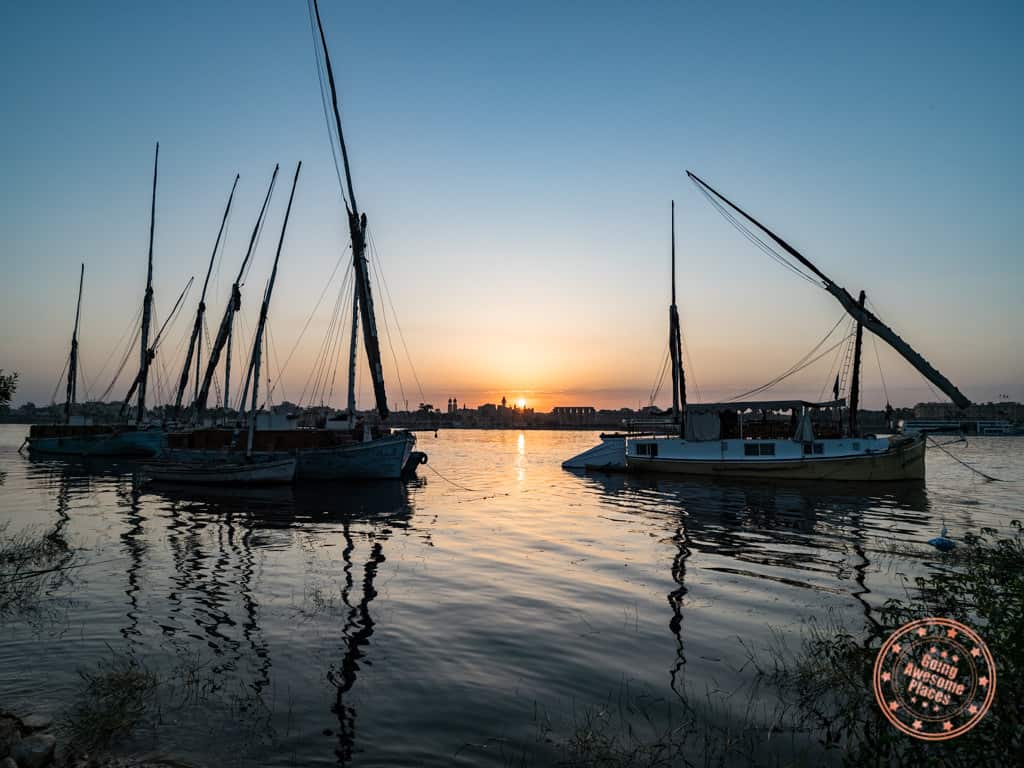
I think this all depends on what kind of solo traveller you are. On one end of the spectrum you can be a solo traveller that books a large group tour with say Intrepid or G Adventures and on the other end, you completely rely on local taxis, buses, trains, and backpack from hostel to hostel.
I’ve done neither so take this for a grain of salt.
I know many people and have met many people along the way that have travelled solo in Egypt. It’s been done and can be an amazing experience if that’s your style of travel.
What you need to be mindful of are the standard smart solo travelling rules but also political and terrorism complexities. All it means is that you need to be careful.
- Do your research ahead of time – As experienced as you might be, it’ll be much easier if you know where you’re going and how to get there. You’ll attract much less attention this way but in the case you do get stuck somewhere, know that Egyptians are super helpful and if you ask, they’ll help. Just be wary of whether they’re looking for payment or not.
- Travel with a buddy – This is what hostels are great for. If you’re putting together something last minute, it might make sense to join up with another group that have something similar planned to what you want to do. Strength in numbers is always helpful.
- Don’t be afraid to get a cab – When in doubt, know that you can always get a taxi which is better than being lost and walking in neighbourhoods you really shouldn’t be in.
- Join a tour – As a solo traveller, it’s totally cool to join an organized tour. It takes the stress away from knowing all the small details and you get the bonus of meeting amazing people on your journey.
- Dress and act conservative – Women especially will need to keep this in mind. As a Muslim country, staying covered is what’ll help you from drawing too much unwanted attention.
- Get ready for some hassling – This applies more for women but you have to go into Egypt with the mindset that people will try to talk to you or might get a little aggressive. Learn to politely say “no” and walk away. Ignore cat calls completely. A tool that might be helpful is Harass Map where travellers have marked down areas where they’ve experienced some form of harassment.
- Wear sunglasses – Eye contact is often the start and one way you can mitigate that is to wear sunglasses so nobody knows where you’re looking. Hey, it’s also super sunny outside so there’s that too.
Travel insurance in Egypt
I always travel with travel insurance but if you consider everything around political instability and threat of terrorism, this is a must-have for anyone travelling to Egypt.
When it comes to travel insurance, World Nomads provide great coverage for anyone around the world and in all destinations. If you’ve never heard of them, make sure to read our full review of World Nomads.
Health concerns in Egypt
I go into detail on this topic in the Egypt travel guide. Here’s a summary of what you need to know:
- No malaria or yellow fever
- Only eat cooked foods (unless it’s fruit or vegetables that have a shell or skin)
- Water is safe to brush your teeth but not for drinking
- Avoid ice because it’s usually made from tap water
- Traveller’s diarrhea is common in Egypt so try to be careful. Dukoral is something you should consider.
General safety tips for Egypt
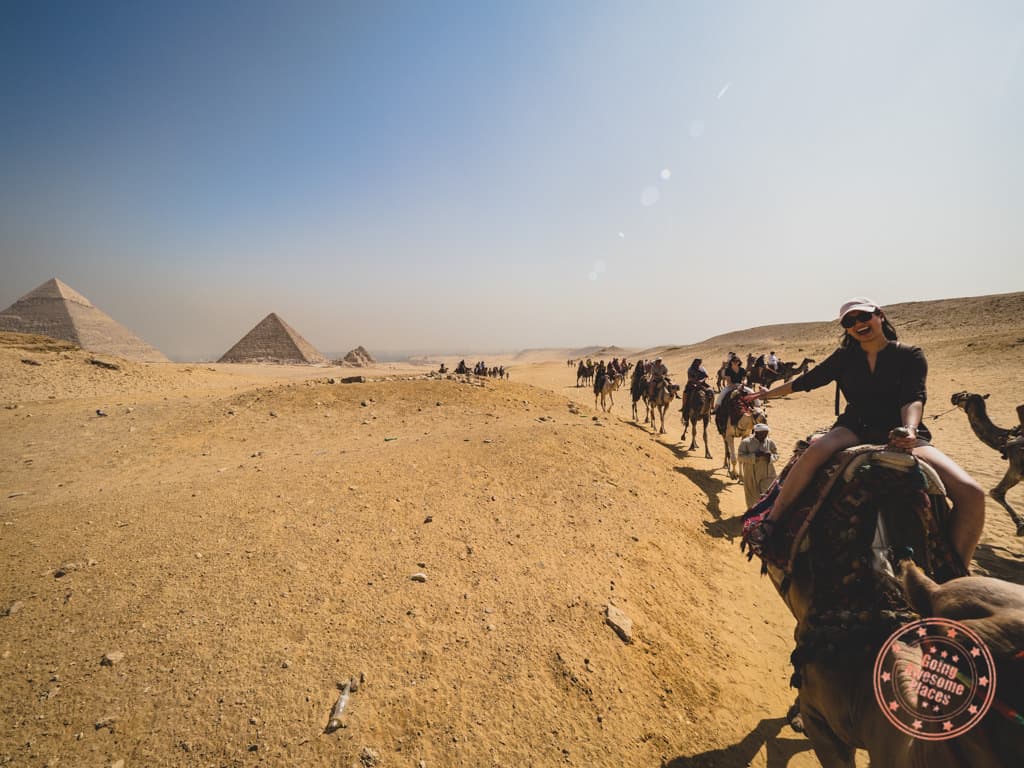
It feels like there’s a lot to worry about when travelling to Egypt but really I’m just summarizing everything that I learned from being there and spending 10 days on my latest trip. Most of it is common sense but the remaining part is from things we observed and thankfully what our guides told us.
Here’s a compilation of everything I haven’t covered so far and things to add to your trip planning notes as you prepare for Egypt.
- Booking a private tour has many benefits – Not knocking the big tour buses but if you think about the terrorist attacks, they’ve always targeted the big busses. A private tour like the one we did with Djed is in my mind the smartest way to do it if you’re travelling as a couple, a larger group, or even solo. Yes, the price is slightly more but the benefits outweigh this. With a private tour you also get your own Egyptologist and while it’s not security related, it’ll make your trip 100x better. It’s this guide that’ll also give you all the heads up you need to know about what to be careful about.
- Don’t rent or drive a car – This is not the kind of country you can just pick up a car and go. The traffic and driving styles are simply scary here which is more the reason why having your own guide and driver is the way to go.
- Caution taking photos/videos of people in markets – Our guide stressed this quite a lot when we were walking through Cairo’s local souk and Khan el-Khalili. Only take photos/videos of people if you’ve asked for permission. This where a guide comes in handy too because they can ask for you.
- Don’t do anything stupid in secure areas – At security check points, military areas, or anywhere a round police, stay cool and don’t do anything dumb. This includes taking photos of military installations and government buildings. Playing the tourist card isn’t going to work.
- No you can’t climb the pyramids – This is a newer rule because of a couple of idiots but this is definitely a no-no now.
- Discrete and respectful – Conservative is the key word in Egypt. Dress and act appropriately.
- Keep copies of your identification with you – you’ll probably have to show these, and losing your passport isn’t fun.
- Special religious celebrations or any large gatherings – These tend to be targets for terrorists so try to stay away.
- LGBTQ travellers should be careful – Try to be discrete here as Egypt is simply not very open when it comes to this.
- Even ANY type of public display of affection is frowned upon – get a room – literally. Probably don’t even hold hands.
- Don’t get burnt – By that I mean the sun. It is strong in Egypt and in most places you visit there will rarely be cover so make sure you have lots of water and be generous with your sunscreen.
- Bring mosquito repellent – Depending on the time of the year you go, they’ll be out in full force at dawn and dusk. There’s luckily no malaria or yellow fever to worry about but bring protection.
- Don’t bring a drone – It’s outright banned without extremely special permission so even if you’re passing through Egypt to somewhere else on your journey, you’ll need a way for it to bypass Egypt altogether.
- Watch your bags and phones – This might not be as rampant as some parts of Europe but it’s still smart to be vigilent here.
- No alcohol on the street – This is a Muslim country and alcohol isn’t allowed unless it’s in a licensed area.
Gear that can help you stay safe
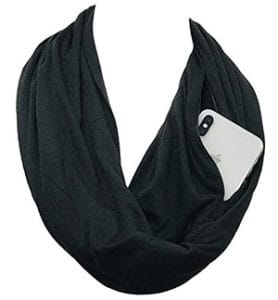
Keep your essentials safe
You don’t need to wear an uncomfortable money belt to stay safe. These infinity scarves with zippered pockets are great to keep your passport, keys, and phone safe and do it in a stylish, unobtrusive, and classy way. It is perfect for travel in Egypt.
Recommended tour operators in Egypt
If you’ve learned anything from the above, it’s the fact that I highly recommend travelling with an operator while in Egypt. This is a sure-fire way to eliminate almost all of the risks when it comes to safety.
- Guides help you navigate away from common scams.
- You’re less likely to run into an issue if you’re travelling with a local guide.
- Eliminates the need to navigate local transit or driving yourself (including military check points).
- Takes the stress away from even having to think about safety so that you can enjoy your experience to the fullest.
So who do we recommend?
Well, I’ve travelled with Djed Egypt Travel twice in Egypt so they’re hands down one of my favourites if you don’t mind working with a local company. The tradeoff is that their communication via e-mail/Skype can be a bit spotty at times (read that as slow) but rest assured they’re legit and their staff is top notch.
Travelling with Djed Egypt Travel
Egyptian run and locally owned, I’ve travelled in Egypt with them twice and I can safely say that they’re one of the best in the businesses. They have dedicated teams of people at each major city (Cairo, Luxor, Aswan) and they own their own dahabiyas as well which means they have full control of the experience.
For those that want to work with a reputable brand, there’s no better company than G Adventures and their portfolio of Egypt tours. They are known to run incredible experiences there where there is always a focus on sustainable travel, giving back to local communities, and finding unique experiences that you can’t find anywhere else with their special partnerships on the ground.
The closest tour package they have that’s similar to our 10 day Egypt itinerary is their 12 day Egypt Upgraded – Plus.
Final thoughts
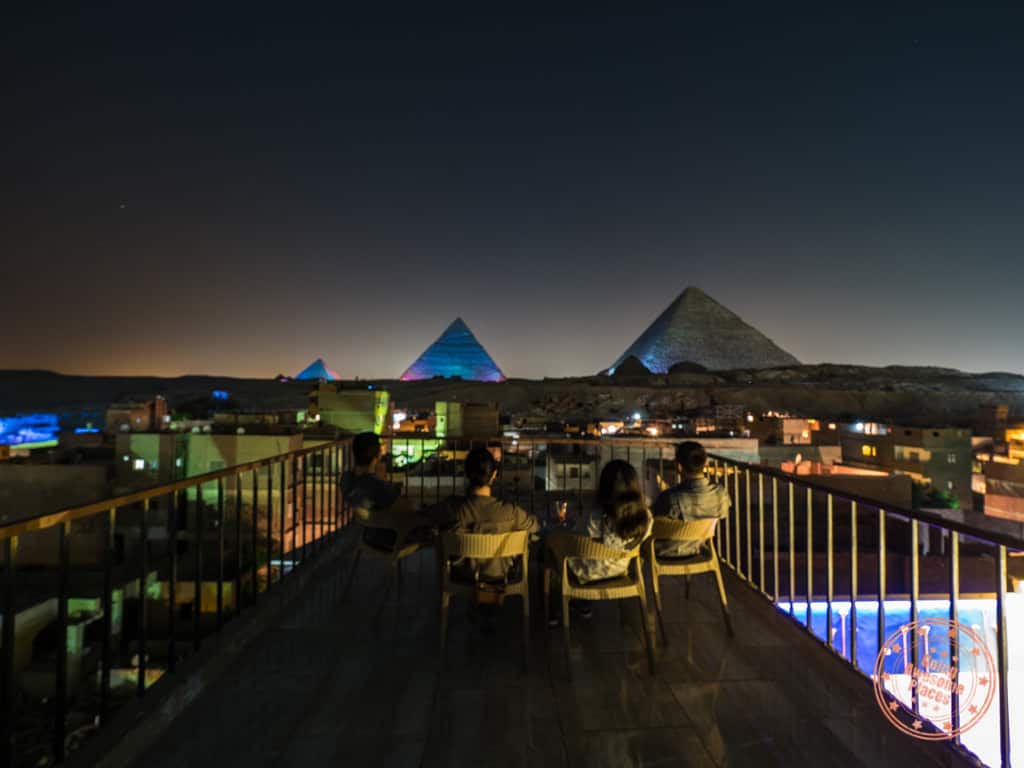
Let’s circle back on the original question: “is Egypt safe for travel?”. My opinion? Yes, it is but if it were me I’d only do it in a specific way: work with a local tour company, travel as a group (family, significant other, or friends), book a private tour,
Thinking through everything that we saw in Egypt when it came to safety, the reason why we were able to have such a positive experience was because we had good guides that acted as our shields in many ways of the crap that can happen out there. Secondly, having the right mindset and expectations makes sure that you can shrug off whatever comes your way.
Ultimately, you can’t travel to Egypt expecting it to be like a United Kingdom, Singapore, or New Zealand.
Hopefully this guide has been helpful. Now that you know what to expect, you’ll be sure to have an incredible time in Egypt. It’s truly a special place that’ll be one of the top trips you’ve ever done.
Lastly, whatever you do, don’t forget to pick up travel insurance!
What you should read next
